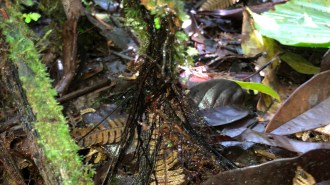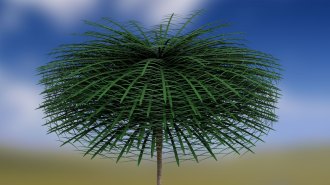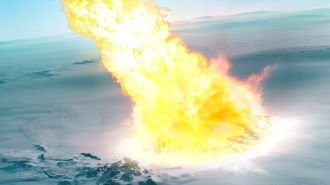News
-
 Animals
AnimalsMigratory fish species are in drastic decline, a new UN report details
The most comprehensive tally of how migrating animals are faring looks at more than 1,000 land and aquatic species and aims to find ways to protect them.
-
 Artificial Intelligence
Artificial IntelligenceHow do babies learn words? An AI experiment may hold clues
Using relatively little data, audio and video taken from a baby’s perspective, an AI program learned the names of objects the baby encountered.
-
 Neuroscience
NeuroscienceA new device let a man sense temperature with his prosthetic hand
A device that can be integrated into prosthetic hands capitalizes on phantom sensations to enable users to sense hot and cold.
By Simon Makin -
 Animals
AnimalsHere’s how many shark bites there were in 2023
The chance of being bitten by a shark is still incredibly slim, according to a new report from the Florida Museum of Natural History.
-
 Animals
AnimalsThe first known scorpion to live with ants carries mini hitchhikers
Small arachnids hitch a ride on the scorpion, possibly to get inside food-rich ant nests.
By Jake Buehler -
 Plants
PlantsHere’s why blueberries are blue
Nanostructures in a blueberry’s waxy coating make it look blue, despite having dark red pigments — and no blue ones — in its skin, a new study reports.
-
 Planetary Science
Planetary ScienceSaturn’s ‘Death Star’ moon might contain a hidden ocean
A fresh look at Cassini data reveals slight changes in the tiny moon’s orbit that suggest the presence of a vast ocean beneath the satellite’s icy shell.
By Adam Mann -
 Plants
PlantsThis weird fern is the first known plant that turns its dead leaves into new roots
Cyathea rojasiana tree ferns seem to thrive in Panama’s Quebrada Chorro forest by turning dead leaves into roots that seek out nutrient-rich soil.
-
 Paleontology
PaleontologyA rare 3-D tree fossil may be the earliest glimpse at a forest understory
The 350-million-year-old tree, which was wider than it was tall thanks to a mop-top crown of 3-meter-long leaves, would look at home in a Dr. Seuss book.
-
 Planetary Science
Planetary ScienceAn asteroid may have exploded over Antarctica about 2.5 million years ago
Tiny spherules of rock found in Antarctic ice may point to the oldest known “airburst,” or midair disintegration of an incoming asteroid.
-
 Chemistry
ChemistryThe smallest known molecular knot is made of just 54 atoms
Chemists are still trying to figure out why this combination of gold, phosphorus, oxygen and carbon atoms resulted in a molecular knot in the first place.
By Anna Gibbs -
 Planetary Science
Planetary ScienceBacteria that can make humans sick could survive on Mars
Experiments suggest that common illness-causing microbes could not only survive on the Red Planet but also might be able to thrive.
By Adam Mann